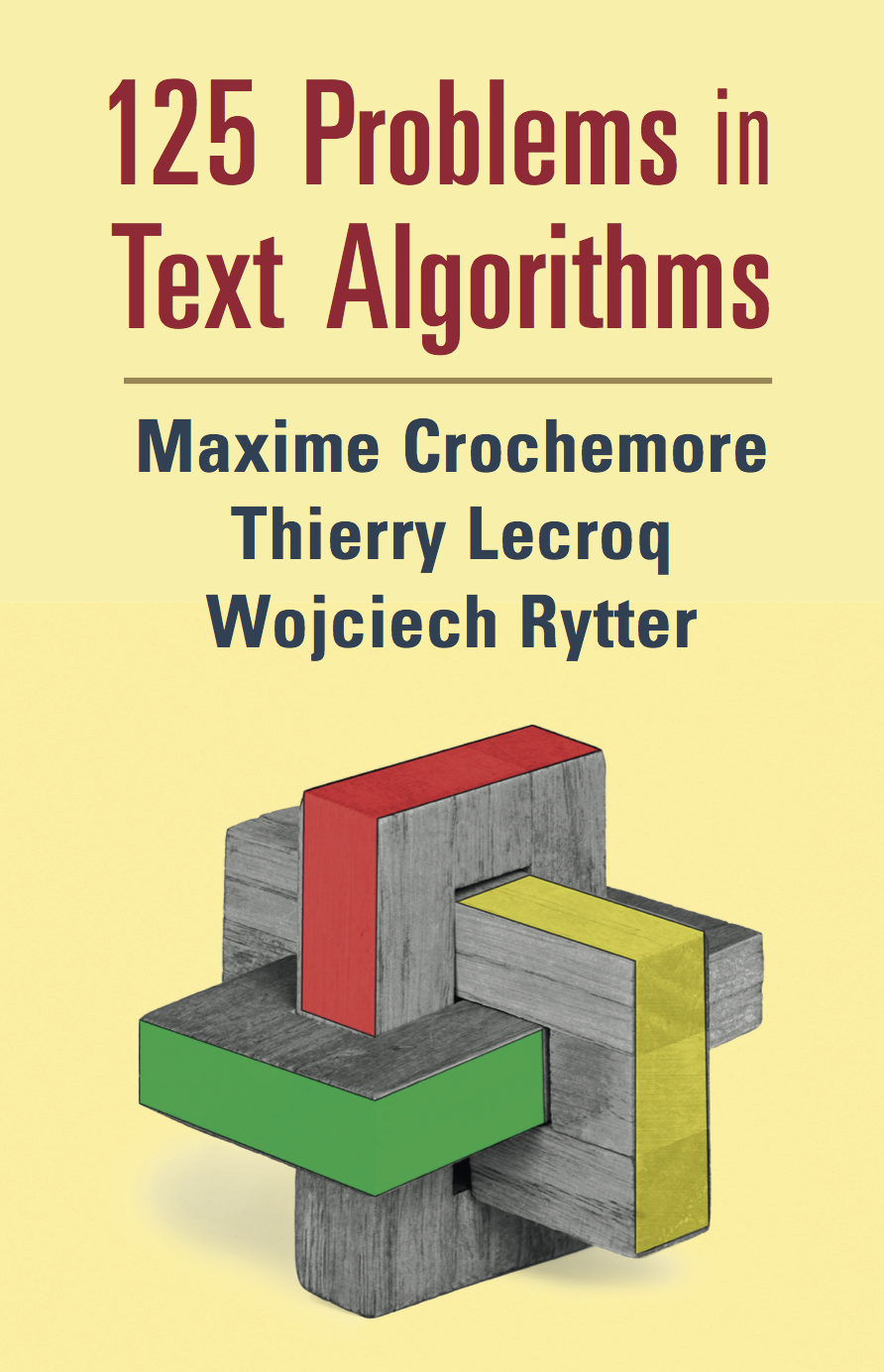
- Stringology
- Combinatorial Puzzles
- 1: Stringologic proof of Fermat's little theorem
- 2: Simple case of codicity testing
- 3: Magic squares and Thue-Morse word
- 4: Oldenburger-Kolakoski sequence
- 5: Square-free game
- 6: Fibonacci words and Fibonacci numeration system
- 7: Wythoff's game and Fibonacci word
- 8: Distinct periodic words
- 9: A relative of Thue-Morse word
- 10: Thue-Morse words and sums of powers
- 11: Conjugates and rotations of words
- 12: Conjugate palindromes
- 13: Many words with many palindromes
- 14: Short superword of permutations
- 15: Short supersequence of permutations
- 16: Skolem words
- 17: Langford words
- 18: From Lyndon words to de Bruijn words
- Pattern Matching
- 19: Border table
- 20: Shortest covers
- 21: Short borders
- 22: Prefix table
- 23: Border table to Maximal suffix
- 24: Periodicity test
- 25: Strict borders
- 26: Delay of sequential string matching
- 27: Sparse matching automaton
- 28: Comparison-effective string matching
- 29: Strict border table of Fibonacci word
- 30: Words with singleton variables
- 31: Order-preserving patterns
- 32: Parameterised matching
- 33: Good-suffix table
- 34: Worst case of Boyer-Moore algorithm
- 35: Turbo-BM algorithm
- 36: String-matching with don't cares
- 37: Cyclic equivalence
- 38: Simple maximal suffix computation
- 39: Self-maximal words
- 40: Maximal suffix and its period
- 41: Critical position of a word
- 42: Periods of Lyndon word prefixes
- 43: Searching Zimin words
- 44: Searching irregular 2D-patterns
- Efficient Data Structure
- 45: List algorithm for shortest cover
- 46: Computing longest common prefixes
- 47: Suffix array to Suffix tree
- 48: Linear Suffix trie
- 49: Ternary search trie
- 50: Longest common factor of two words
- 51: Subsequence automaton
- 52: Codicity test
- 53: LPF table
- 54: Sorting suffixes of Thue-Morse words
- 55: Bare Suffix tree
- 56: Comparing suffixes of a Fibonacci word
- 57: Avoidability of binary words
- 58: Avoiding a set of words
- 59: Minimal unique factors
- 60: Minimal absent words
- 61: Greedy superstring
- 62: Shortest common superstring of short words
- 63: Counting factors by length
- 64: Counting factors covering a position
- 65: Longest common-parity factors
- 66: Word square-freeness with DBF
- 67: Generic words of factor equations
- 68: Searching an infinite word
- 69: Perfect words
- 70: Dense binary words
- 71: Factor oracle
- Regularities in Words
- 72: Three square prefixes
- 73: Tight bounds on occurrences of powers
- 74: Computing runs on general alphabets
- 75: Testing overlaps in a binary word
- 76: Overlap-free game
- 77: Anchored squares
- 78: Almost square-free words
- 79: Binary words with few squares
- 80: Building long square-free words
- 81: Testing morphism square-freeness
- 82: Number of square factors in labelled trees
- 83: Counting squares in combs in linear time
- 84: Cubic runs
- 85: Short square and local period
- 86: The number of runs
- 87: Computing runs on sorted alphabet
- 88: Periodicity and factor complexity
- 89: Periodicity of morphic words
- 90: Simple anti-powers
- 91: Palindromic concatenation of palindromes
- 92: Palindrome trees
- 93: Unavoidable patterns
- Text Compression
- 94: BW transform of Thue-Morse words
- 95: BW transform of balanced words
- 96: In-place BW transform
- 97: Lempel-Ziv factorisation
- 98: Lempel-Ziv-Welch decoding
- 99: Cost of Huffman code
- 100: Length-limited Huffman coding
- 101: On-line Huffman coding
- 102: Run-length encoding
- 103: A compact Factor automaton
- 104: Compressed matching in Fibonacci word
- 105: Prediction by partial matching
- 106: Compressing Suffix arrays
- 107: Compression ratio of greedy superstrings
- Miscelleanous
- 108: Binary Pascal words
- 109: Self-reproducing words
- 110: Weights of factors
- 111: Letter-occurrence differences
- 112: Factoring with border-free prefixes
- 113: Primitivity test for unary extensions
- 114: Partially commutative alphabets
- 115: Greatest fixed-density necklace
- 116: Period-equivalent binary words
- 117: On-line generation of de Bruijn words
- 118: Recursive generation of de Bruijn words
- 119: Word equations with given lengths of variables
- 120: Diverse factors over a 3-letter alphabet
- 121: Longest increasing subsequence
- 122: Unavoidable sets via Lyndon words
- 123: Synchronising words
- 124: Safe-opening words
- 125: Superwords of shortened permutations
- Extra Problems
- 126: Computing short distinguishing subsequence
- 127: String attractors
- 128: Words with distinct cyclic k-factors
- 129: Shrinking a text by pairing adjacent symbols
- 130: Local periodicity lemma with one don't care symbol
- 131: Idempotent equivalence
- 132: 1-error correcting linear Hamming codes
- 133: Huffman codes vs entropy
- 134: Compressed pattern matching in Thue-Morse words
- 135: The words representing combinatorial generations
- 136: 2-anticovers
- 137: Short supersequence of shapes of permutations
- 138: Subsequence covers
- 139: Yet another application of suffix trees
- 140: Two longest subsequence problems
- 141: Two problems on run-length encoded words
- 142: Maximal number of (distinct) subsequences
- 143: Avoiding grasshopper repetitions
- 144: Counting unbordered words and relatives
- 145: Cartesian tree pattern-matching
- 146: List-constrained square-free strings
- 147: Superstrings of shapes of permutations
- 148: Linearly generated words and primitive polynomials
- 149: An application of linearly generated words
- 150: Text index for patterns with don't care symbols



